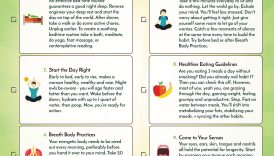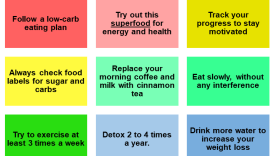Achieving Balance: The Key to a Healthy Lifestyle

Importance of Balance in a Healthy Lifestyle
In today’s fast-paced world, achieving balance in a healthy lifestyle is crucial for overall well-being. Balance isn’t just about managing time; it’s about aligning various aspects of life—physical health, mental clarity, social connections, and work commitments—to create a harmonious existence. When every element is in sync, individuals experience enhanced energy levels, improved emotional health, and greater satisfaction in their daily routines. For example, consider Sarah, a working mom juggling her job, household responsibilities, and children’s activities. By prioritizing balance, she learned to carve out time for exercise and self-care, leading to more productive workdays and a better mood at home. Here are some reasons why balance matters:
- Achieving Balance: The Key to a Healthy Lifestyle
- Importance of Balance in a Healthy Lifestyle
- Common Challenges in Achieving Balance
- Physical Health
- Exercise and Rest
- Nutrition and Hydration
- Mental Health
- Stress Management
- Mindfulness and Meditation
- Social Well-being
- Building Relationships
- Setting Boundaries
- Work-Life Balance
- Time Management
- Prioritizing Tasks
- Enhanced Health: A balanced lifestyle reduces the risk of chronic diseases such as obesity, diabetes, and heart-related issues.
- Improved Productivity: Achieving equilibrium in work and personal life can lead to increased focus and effectiveness in tasks.
- Emotional Resilience: Maintaining balance can bolster mental health, providing a buffer against stress and anxiety.
Common Challenges in Achieving Balance
Despite understanding the importance of balance, it’s not always easy to achieve. Many people face common challenges that can disrupt their efforts. Some of these challenges include:
- Overcommitment: Saying “yes” too often can lead to burnout. Whether it’s taking on extra projects at work or committing to social obligations, overloading one’s schedule is a frequent pitfall.
- Lack of Time: Busy lifestyles can make it difficult to carve out the necessary time for exercise, relaxation, or social interaction.
- Neglecting Self-Care: When life gets hectic, personal well-being often takes a backseat. This neglect can manifest in physical exhaustion and emotional distress.
Recognizing these challenges is the first step toward overcoming them. Creating a sustainable plan and setting clear priorities can significantly contribute to achieving the desired balance, leading to a fulfilling and healthy lifestyle.
Physical Health
Exercise and Rest
Continuing the journey to a balanced lifestyle, the pillars of physical health stand tall: exercise and rest. Finding the right equilibrium between these two elements is vital for maintaining not just physical fitness but also overall well-being. Regular exercise goes beyond just losing weight; it strengthens the heart, boosts mood, and increases energy levels. For instance, John, a marketing executive, started dedicating just 30 minutes a day to a brisk walk during his lunch break. The result? Improved focus and creativity at work, not to mention a weight loss of ten pounds within a couple of months! However, rest is just as important. Overtraining can lead to fatigue and injuries, undermining your efforts. It’s essential to listen to your body. Here are some tips for balancing exercise and rest:
- Schedule Active Rest Days: Incorporate activities like stretching or yoga on days you don’t engage in intense workouts.
- Prioritize Sleep: Aim for 7-9 hours of quality sleep each night to allow your body to recover and repair.
- Be Mindful of Signs: Fatigue, irritability, or a lack of motivation might indicate that you need more rest.
Nutrition and Hydration
Nutrition and hydration also play a significant role in physical health. Fueling the body with the right foods helps in achieving optimal performance in daily activities and workouts. Consider Maria, a college student who learned to prep her meals instead of relying on fast food. She shared how her energy levels skyrocketed when she started focusing on whole foods packed with nutrients. To maintain a balanced diet, consider these key points:
- Incorporate Variety: Include fruits, vegetables, lean proteins, and whole grains in your meals.
- Watch Portion Sizes: Eating smaller portions can prevent overeating, especially when it comes to calorie-dense foods.
- Stay Hydrated: Drinking enough water is essential. Aim for at least 8 glasses a day, adjusting for activity levels.
In summary, a harmonious blend of exercise, rest, nutrition, and hydration is the foundation of physical health and can significantly impact one’s overall quality of life. By committing to these principles, individuals can create a sustainable lifestyle that supports their health journey.
Mental Health
Stress Management
Transitioning into mental health, managing stress effectively is a cornerstone of maintaining a balanced lifestyle. In modern society, stress can often feel like an unwelcome companion, manifesting in both physical and emotional ways. The good news is that there are plenty of strategies to help mitigate its impact. Take David, for example, an IT specialist who found himself feeling overwhelmed by tight deadlines and constant notifications. By implementing a few stress management techniques, he transformed his experience. His toolkit included:
- Breathing Exercises: Simple, deep breathing techniques helped him regain focus during stressful moments.
- Prioritization: He adopted the Eisenhower Matrix, allowing him to distinguish between urgent and important tasks.
- Time Blocks: David scheduled specific times for intense focus followed by breaks, enhancing productivity while reducing stress.
Mindfulness and Meditation
Another crucial aspect of mental health is practicing mindfulness and meditation. These techniques can create a powerful sense of calm and insight, enabling individuals to respond to stress rather than react impulsively. Sarah, a freelance writer, discovered meditation after feeling overwhelmed by competing client demands. By dedicating just ten minutes each morning to mindfulness, she developed greater awareness and reduced her anxiety levels significantly. Here’s how to get started on your mindfulness journey:
- Find a Quiet Space: Choose a spot with minimal distractions where you can sit comfortably.
- Settle into Breathing: Focus on your breath. Inhale deeply through the nose and exhale slowly through the mouth.
- Practice Regularly: Like any skill, consistency is key. Aim to meditate daily, gradually increasing the duration as you become comfortable.
Incorporating Mindfulness into Daily Activities:
- Eat mindfully by savoring each bite.
- Engage in mindful walking, focusing on the sights and sounds around you.
Together, effective stress management and the practice of mindfulness and meditation create a strong foundation for mental health. They empower individuals to navigate life’s challenges with resilience and grace, thereby enhancing their overall well-being. By adopting these practices, individuals can ensure that their mental health is nurtured alongside their physical health, paving the way for a truly balanced lifestyle.
Social Well-being
Building Relationships
As we dive deeper into the fabric of a balanced lifestyle, social well-being emerges as a key aspect. Building strong relationships can provide a support system that enriches life experiences and enhances mental health. Meaningful connections with family, friends, and colleagues foster feelings of belonging and happiness. Take Emily, for example. After moving to a new city for work, she initially struggled to make friends. Realizing that social connections were essential to her happiness, she took proactive steps to build relationships. Here’s what worked for her:
- Join Local Groups: Emily joined a book club, where she met like-minded individuals who shared her interests.
- Volunteer: Giving back to the community not only allowed her to meet others but also provided a sense of fulfillment.
- Be Open and Approachable: Simple gestures like smiling and engaging in casual conversations led to new friendships.
The importance of nurturing relationships cannot be overstated, as they provide emotional support during difficult times and enhance overall well-being.
Setting Boundaries
While building relationships is vital, it’s equally important to establish healthy boundaries. Setting boundaries helps maintain a sense of personal space, allowing individuals to protect their energy and prioritize their well-being. Consider Alex, a project manager who initially struggled with saying no to additional responsibilities at work and social events. This led to overwhelming stress and burnout. By setting clear boundaries, he was able to reclaim his time and mental health. Here’s how he did it:
- Communicate Clearly: Alex learned to express his limits honestly with colleagues and friends.
- Assess Commitments: Before agreeing to anything new, he reflects on his current obligations and emotional capacity.
- Practice Self-Care: Allocating time for personal relaxation and hobbies became a priority, reinforcing the value of his boundaries.
Benefits of Setting Boundaries:
- Reduced stress levels
- Improved relationships
- Enhanced self-esteem
Ultimately, fostering social well-being through building relationships and setting boundaries is crucial for a balanced lifestyle. Strong connections nourish the spirit, while healthy boundaries safeguard personal space. By embracing both, individuals can experience an enriching and harmonious social life that complements their physical and mental health.
Work-Life Balance
Time Management
With the foundation of social well-being established, it’s time to explore the crucial aspect of work-life balance, starting with effective time management. The ability to manage time well can significantly impact one’s productivity and emotional health, allowing for a smoother integration of work responsibilities and personal life. Take Rachel, a busy graphic designer who once felt bogged down by endless to-do lists and looming deadlines. Determined to regain control over her commitments, she began implementing time management strategies that transformed her daily routine. Here are some techniques she found effective:
- Create a Daily Schedule: Rachel began each day by mapping out her tasks, allocating specific time slots for each project and personal activity.
- Use Digital Tools: Utilizing apps like Trello and Google Calendar helped her stay organized and reminded her of upcoming deadlines.
- Set Timers for Focus: By employing the Pomodoro Technique—working in bursts of 25 minutes followed by a 5-minute break—she maximized her focus and productivity.
Prioritizing Tasks
Alongside effective time management, mastering the art of prioritizing tasks is essential for achieving work-life balance. It enables individuals to distinguish between what needs immediate attention and what can wait, reducing stress and enhancing satisfaction. For instance, Jacob, a project manager, learned to prioritize his work-related tasks by applying the Eisenhower Matrix, which categorizes tasks into four quadrants:
- Urgent and Important: Tasks that require immediate attention.
- Important but Not Urgent: Tasks that are important but can be scheduled for later.
- Urgent but Not Important: Tasks that need to be done quickly but can be delegated.
- Neither Urgent nor Important: Tasks that can be dropped altogether.
Jacob’s approach included:
- Weekly Reviews: At the beginning of each week, he assessed his tasks and adjusted his priorities accordingly.
- Saying No: By recognizing his limits, he learned to decline additional projects that would overwhelm his schedule.
- Celebrating Small Wins: Acknowledging completed tasks—no matter how small—boosted his morale and motivated him to stay on track.
In conclusion, striking a work-life balance hinges on effective time management and prioritizing tasks. By adopting these strategies, individuals can navigate their professional responsibilities while still enjoying personal lives that are rich and fulfilling. The journey to balance is ongoing, and with the right tools, anyone can achieve harmony between their work and personal commitments.




